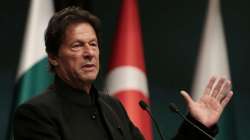Pakistan PM Imran Khan left red-faced in Beijing: Here's what happened
Imran Khan took with himself a huge delegation for the visit during which he will also attend the opening ceremony of the Winter Olympic Games.

Imran Khan Beijing News: Pakistan Prime Minister Imran Khan arrived in Beijing late on Thursday on a four-day visit to meet Chinese leadership, including Xi Jinping. Imran Khan took with himself a huge delegation for the visit during which he will also attend the opening ceremony of the Winter Olympic Games.
Khan's 'high-level' delegation has Foreign Minister Shah Mahmood Qureshi, Finance Minister Shaukat Tarin, Planning Minister Asad Umar, Information Minister Fawad Chaudhry, National Security Advisor Moeed Yousaf, Commerce Advisor Abdul Razak Dawood and Special Assistant on China- Pakistan Economic Corridor (CPEC) Khalid Mansoor.
However, the Pakistan PM and his team were left red-faced when they were informed that one of the key meetings, for which they had flown from Islamabad to Beijing, would be held in virtual mode.
A tweet from Pakistan PM's office confirmed that the meeting with He Lifeng, chairman of China's National Development and Reform Commission (NDRC) and vice chairman of the Chinese People's Political Consultative Conference was held virtually.
Imran Khan's China visit has come at a time when Pakistan finds itself in a quagmire of issues. On one hand, the condition of Pakistan's economy has gone from bad to worse, and on another security scenario within the country particularly in the restive Balochistan region and Afghan border has added to Imran Khan's troubles.
ALSO READ: Pakistan: 15 terrorists, 4 soldiers killed in attacks on security posts in Balochistan
A report said that the Pakistan government has decided to seek loans worth $5 billion from countries including China, Russia and Kazakhstan in a desperate attempt to stabilise the shrinking foreign reserves.
As per the details, Pakistan plans to seek $3 billion from China and $2 billion from Russia and Kazakhstan.
Sources revealed that Islamabad plans to borrow $3 billion from China to stabilise its forex reserves, while additional $2 billion from Russia and Kazakhstan would be spent on the ML-1 Railways project.
It is pertinent to mention here that Pakistan has been striving to revive the suspended loan programme worth $6 billion from the International Monetary Fund (IMF).
(With inputs from agencies)